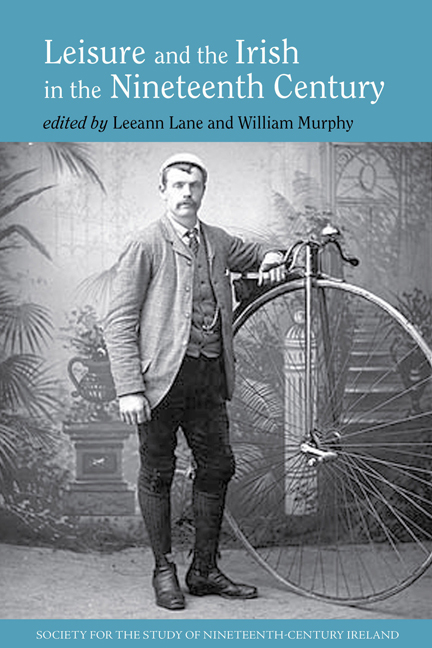Book contents
- Frontmatter
- Contents
- List of Figures and Tables
- Introduction
- Leisure and Associational Culture
- Leisure Spaces
- Leisure in Literature
- 6 Leisure in Charles Lever's Jack Hinton (1842) and the Continuities of Irish Fiction
- 7 The Fighting Irish: Faction Fighting as Leisure in the Writings of William Carleton
- 8 The Humours of Provincial Life: Theatre and Tourism in Matthew Archdeacon's Everard
- Leisure, Tourism and Travel
- Leisure and Female Élites
- Notes on Contributors
- Index
8 - The Humours of Provincial Life: Theatre and Tourism in Matthew Archdeacon's Everard
from Leisure in Literature
- Frontmatter
- Contents
- List of Figures and Tables
- Introduction
- Leisure and Associational Culture
- Leisure Spaces
- Leisure in Literature
- 6 Leisure in Charles Lever's Jack Hinton (1842) and the Continuities of Irish Fiction
- 7 The Fighting Irish: Faction Fighting as Leisure in the Writings of William Carleton
- 8 The Humours of Provincial Life: Theatre and Tourism in Matthew Archdeacon's Everard
- Leisure, Tourism and Travel
- Leisure and Female Élites
- Notes on Contributors
- Index
Summary
The Castlebar novelist Matthew Archdeacon (1798–1853) is remembered less as an artist than as a recorder of local traditions: Connaught: A tale of 1798 (1830) draws on local traditions of the French landing, and the historical novel Shawn na soggarth, or the priest hunter (1844) is a fictionalised account of eighteenth-century events that were in turn reabsorbed into local folk memory in connection with ongoing nineteenth-century sectarian disputes in Galway/Mayo. In general, however, Archdeacon has attracted little critical attention, partly because his life is scantily documented. This chapter draws on the archives of the Royal Literary Fund and other sources to provide new biographical information, and offers a critical assessment of Archdeacon's four published novels. In particular, it argues that Archdeacon's second novel, Everard: A tale of the nineteenth century (1835), deserves attention as a portrayal of early-nineteenth-century Irish provincial life (with a glance at early-1820s literary Dublin) and as a study of a mildly Byronic young man adrift on the margins of provincial bourgeois life, whose artistic pursuits can be seen as those of a free spirit raised above the petty constraints of his neighbours, or as the folly of a dreamer who fails to realise that necessity debars him from sharing the pursuits of the leisured classes.
The first section outlines Archdeacon's career and publications, with particular reference to his ambiguous position between seeking the patronage of a leisured gentry class and appealing to a middle-class commercial readership. The second examines Everard's portrayal of reading, theatre and tourism, and argues that the novel's treatment of these leisure activities is not only interesting to the social historian but reflects its wider theme of social and cultural insecurity.
I
Matthew Archdeacon was born in Castlebar, County Mayo, on 17 March 1798. (The name Archdeacon is of Kilkenny origin.) He was probably the son of G. Archdeacon, who ran a ‘mathematical and mercantile school’ in Castlebar in 1810. George Henry Moore's reference for Archdeacon calls him ‘the son of a very estimable and distinguished man’, implying the elder Archdeacon was locally prominent.
On 15 November 1824, Archdeacon married Anne Maguire, whose father was an officer in the British army; they had three sons and three daughters.
- Type
- Chapter
- Information
- Leisure and the Irish in the Nineteenth Century , pp. 147 - 166Publisher: Liverpool University PressPrint publication year: 2016



